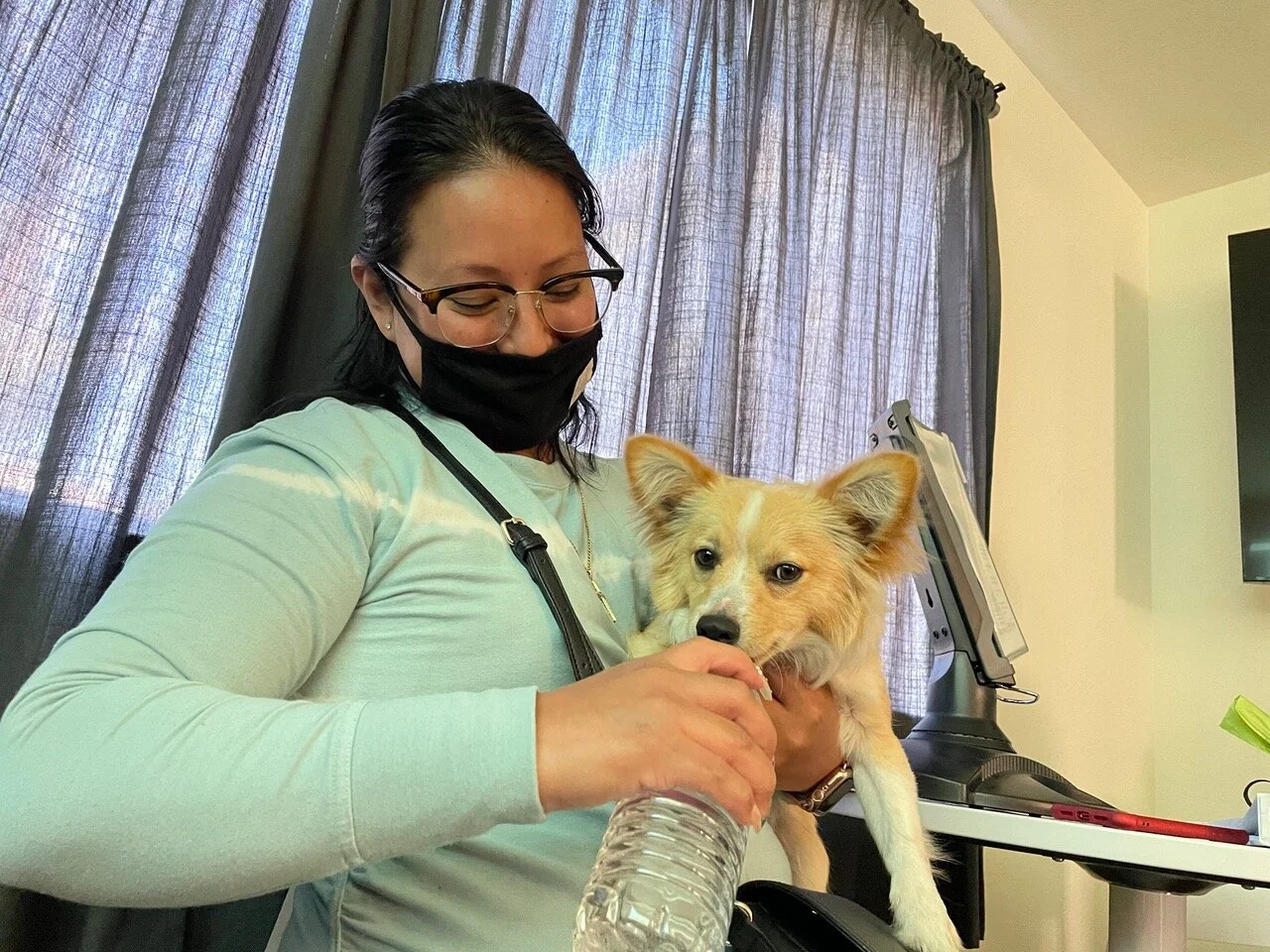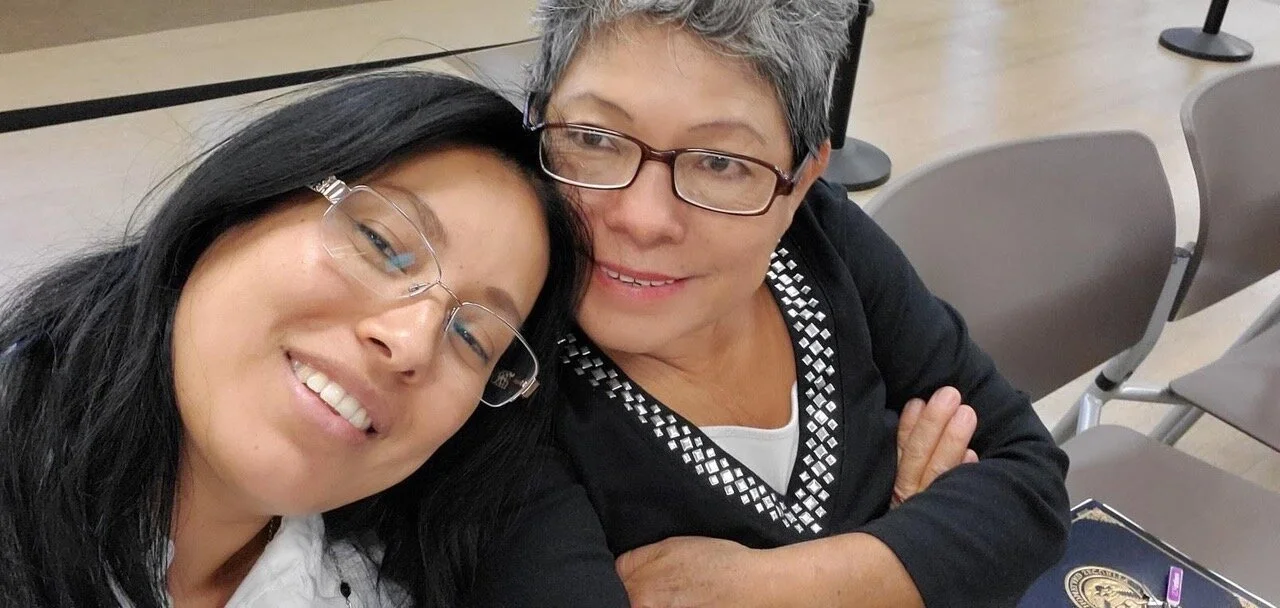Serving up a Fresh Start, New Hope for Domestic Abuse Survivor/Thriver
For the last four years, Nilda Palacios and her mom, Lidia, have had to get creative about finding ways to be together. Then, the COVID-19 pandemic hit, separating the geographically distant mom and daughter duo even further.
Thanks to strong internet and smartphones, FaceTime is serving up comfort and a closer familial connection. Several times a week, the San Francisco-based Nilda, 38, and her mom who lives in LA, prepare home-cooked meals together remotely. Decked out in aprons and oven mitts, Lidia is teaching her daughter how to cook culinary classics like shrimp fettuccini alfredo with basil and fresh fish.
But the cooking classes are serving up more than yummy meals; they’re reconnecting and healing the mother and daughter duo after almost two decades of estrangement.
For the first time since she was in high school, Nilda, who spent almost two decades in prison and years before that on the streets, has found a place to call home. She is one of the first group of women who are receiving transitional housing at Home Free, an apartment complex on San Francisco’s Treasure Island. Opened in 2020, this safe sanctuary is a place for domestic violence survivors who served unfair prison terms for killing their abusers to rebuild their lives. It is believed to be the first of its kind in California.
“I had given up hope,” says Nilda. “Now, my life is starting again.”
Nilda and the others are women who have “endured unspeakable violence and painfully and unjustly ended up in prison because they weren’t allowed to bring in evidence of their abuse,” said Five Keys co-founder Sunny Schwartz.
Now, Nilda and her mother, who are only allowed by the parole board to see each other in person once a year, are embracing the chance to heal their once-severed relationship. Nilda works a full-time job and is looking forward to completing her college degree. She graduated high school and earned an associates degree while behind bars.
Like many women who killed their abusers decades ago, Nilda ended up in prison with a decades-long to life sentence. Many receive life without parole. That changed in 2012 when a new California law allowed the women to go back to the parole board or court and show evidence that they were defending themselves from abuse. Now, one-by-one, in a very slow trickle, these women are queueing up — hoping for their own shot at freedom.
For 17 years, Nilda served time behind bars, ending up in prison and sentenced to 27-years-to-life for killing a man who was abusing her physically and very cruelly emotionally during the time she was homeless and spending some nights at his motor home. She wasn’t allowed to bring into court evidence of abuse. Nilda was released in 2017 from the California Institution for Women in Chino, CA. Her sentence was reduced to involuntary manslaughter and she was given credit for time served. For 16 years prior to that, she spent 16 years in Central California’s Women’s Facility in Chowchilla, the largest women’s prison in the state.
Life hiding in the shadows and suffering, of domestic violence
The road to prison for Nilda at just 17-years-old is pockmarked with years of domestic violence, alcohol and drug abuse and homelessness.
Born on Nov. 27, 1982, she was raised by her single mother in Los Angeles. But after being sexually abused repeatedly by her stepfather and then a high school teacher, Nilda ran away from home, dropped out of school and “abused drugs and alcohol to numb myself,” struggling to survive as a squatter in homeless shelters, the streets and eventually a motor home.
The trauma of those agonizing years has lasted for life, she says. She’s the first to admit, that without the leaders at Home Free and advocates who have fought for change, it’s hard to heal in a culture that stays silent or looks away from people who have experienced sexual violence. Sometimes, rather than acknowledge their pain, others, often the legal system, side with the perpetrator. During her trial, lawyers tried unsuccessfully to introduce Nilda’s childhood and teenage years of violence and the resulting PTSD as a defense.
When the laws changed and she was released, Nilda found temporary housing at a program for substance abusers, which didn’t fit her circumstances. After almost two and a half years, her parole officer discovered Home Free and she found “my first home,” she says. At Home Free, she lives in a two-bedroom apartment with her dog, Milo.
These days, she’s excited about her relationship with her mom and her work as a certified community health worker (lay health advocate) at Omi Family Outpatient Center in San Francisco.
“It’s hard to describe how wonderful it feels to take my dog on walks to the park,” she says. “To ride my bike is heaven. And I’m loving cooking with real pots and pans. I’ve only used plastic bags (microwave) before.”
At Home Free, Nilda is exploring all opportunities for the next phase of her life.
“I want to be accountable and to invest my finances in long-term housing,” she says. “I hope to help clients who are struggling with depression and other mental health issues. I don’t want anyone else to go through what I did.”
ABOUT HOME FREE
San Francisco’s nationally recognized restorative justice organization, Five Keys Schools and Programs, is leading Home Free, a new program that created a residential community in San Francisco and plans to open a second transitional housing site in Los Angeles offering access to life skills and survivor empowerment programs, as well as training and job placement, to criminalized survivors of domestic violence. The women of Home Free are formerly incarcerated domestic violence survivors who spent decades behind bars for simply defending their lives, or being at the scene of a crime under the coercion of their batterer. However, the unfair treatment continues as too many of these women are placed in inappropriate halfway homes, most often residential drug treatment programs, where their unique struggles and untreated trauma continue to go unaddressed.
Please support us at our Virtual Fundraiser on September 30, 2021.
https://www.fivekeyshomefree.org/new-home-for-dinner



